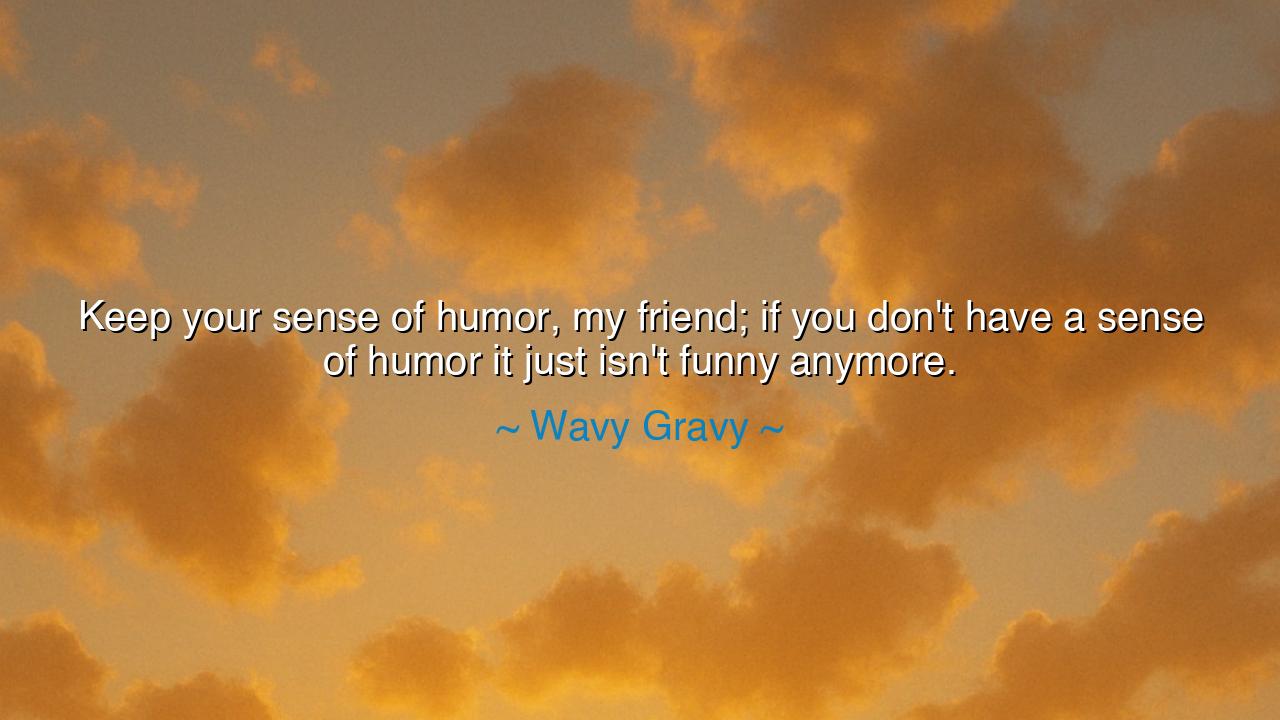
Keep your sense of humor, my friend; if you don't have a sense of
Keep your sense of humor, my friend; if you don't have a sense of humor it just isn't funny anymore.






“Keep your sense of humor, my friend; if you don’t have a sense of humor it just isn’t funny anymore.” Thus spoke Wavy Gravy, the jester-philosopher of a restless age, whose laughter echoed through the storms of protest and peace. His words, playful as they seem, hold within them an ancient wisdom: that humor is not mere amusement, but a shield for the soul, a way of surviving the absurdities of existence. For when the world becomes too heavy, and the heart too weary to rise, the spirit that can still laugh has not yet been conquered.
In the time of our ancestors, the fool was not the weakest in the court, but often the wisest. The jester spoke truth to kings when all others trembled, because he wrapped his insight in laughter. He understood that joy disarms tyranny, and that those who cannot laugh at themselves are prisoners of their own pride. Wavy Gravy, born Hugh Romney, was such a modern fool — clad not in royal silk, but in tie-dye and compassion. During the Woodstock Festival of 1969, when chaos threatened and exhaustion spread through the fields, it was his laughter that calmed the storm. He reminded thousands that peace was not merely a slogan, but a way of seeing — even when covered in mud. That, my friend, is the power of humor: it restores perspective, and with it, hope.
Yet many in this age have forgotten the sacred art of laughter. They mistake seriousness for wisdom, and grimness for strength. But humor is not weakness — it is courage adorned in light. It takes bravery to smile in the midst of ruin, to joke when fate has dealt a cruel hand. The one who can laugh at himself becomes unassailable, for no insult can wound him, no darkness can fully claim him. The stoic emperor Marcus Aurelius once wrote, “The impediment to action advances action.” But the wise fool might add: “The laughter that meets the impediment transforms it into a dance.” Both speak of mastery — the power to turn adversity into grace.
Consider the tale of Viktor Frankl, the psychiatrist who endured the horrors of the Nazi concentration camps. In his memoir Man’s Search for Meaning, he tells how prisoners who could still find humor — even in suffering — were often the ones who survived. A small jest shared among the condemned could restore the will to live. For laughter, he said, was “a weapon of the soul.” When one prisoner told another that someday they would tell their story and people would hardly believe it, they laughed — and in that laughter, they claimed back their humanity. Frankl’s tale reminds us that humor is not a denial of pain, but a defiance of despair.
So, when Wavy Gravy warns that “if you don’t have a sense of humor it just isn’t funny anymore,” he is not speaking of jokes gone stale. He is speaking of life itself — that once we lose our sense of play, the world loses its wonder. The universe, in all its vast absurdity, becomes unbearable without laughter. For humor is not the denial of meaning, but its affirmation. It is the soul’s way of saying: “I still see the beauty beneath the madness.” Without humor, even triumph tastes bitter; with it, even sorrow carries sweetness.
And therefore, my friend, keep your sense of humor as you would guard a sacred flame. When your plans collapse, when those around you speak in bitterness or fear, be the one who smiles and says, “This too shall pass — and someday, we may laugh at it.” For laughter is a bridge across sorrow, a balm for pride, a way to remember that we are but passing travelers in this strange, beautiful, ridiculous world. The one who laughs wisely has already glimpsed eternity.
Take this as your lesson and practice: each day, find something that makes you laugh — not cruelly, not at the expense of another, but with the gentle joy of one who understands the comedy of being alive. When hardship visits you, pause and ask, “How might I smile at this?” Seek the company of those who lift your spirit. Tell stories that heal through humor. And when the world grows heavy with anger and noise, let your laughter ring out — not as mockery, but as a song of freedom. For as long as you can laugh, you are still free, and the world — for one shining moment — becomes funny again.






AAdministratorAdministrator
Welcome, honored guests. Please leave a comment, we will respond soon